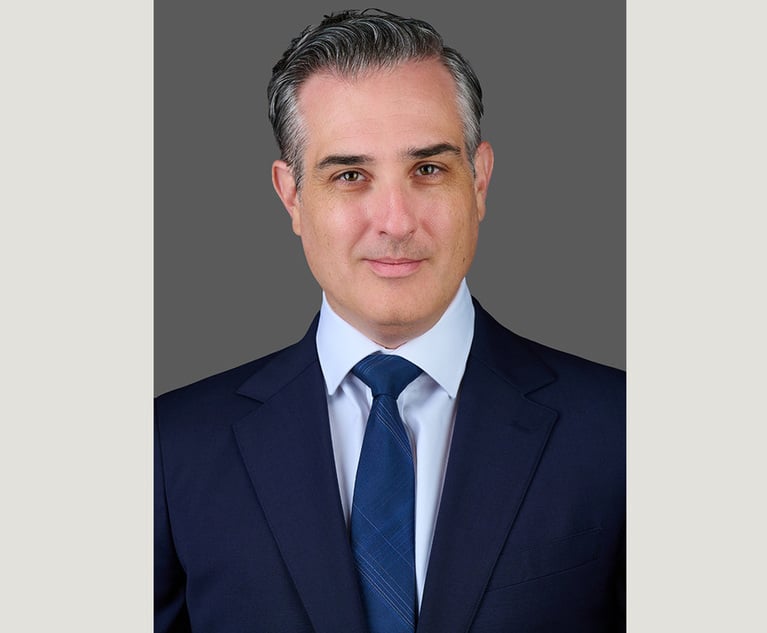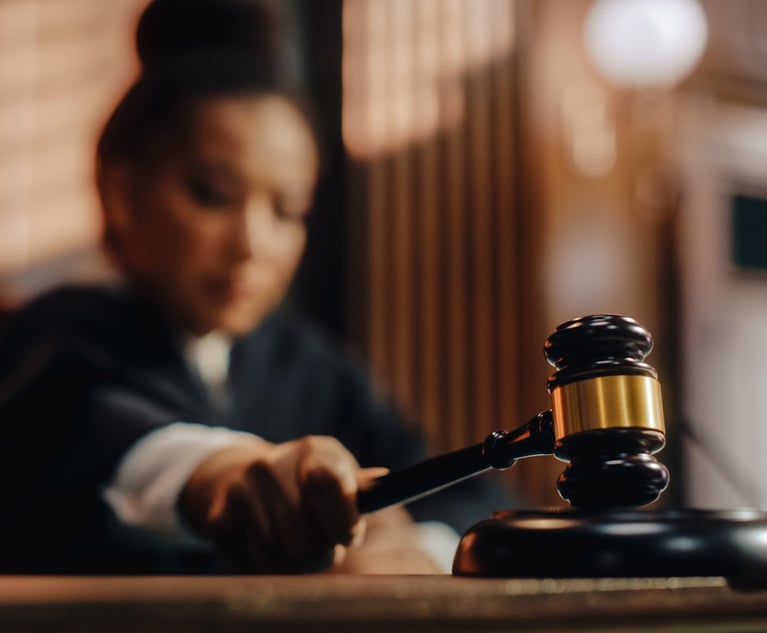Catholic Group Can't Intervene in Pa.'s Suit Against Trump Over Contraceptive Care
A Catholic group opposed to birth control can't intervene in the state's lawsuit challenging the administration's authority to exempt organizations from providing contraceptive services to women.
December 11, 2017 at 02:31 PM
7 minute read

A Catholic group opposed to birth control can't intervene in the state's lawsuit challenging the administration's authority to exempt organizations from providing contraceptive services to women.
U.S. District Judge Wendy Beetlestone of the Eastern District of Pennsylvania denied a motion by the Little Sisters of the Poor Saints Peter and Paul, composed of nuns, to intervene in the state of Pennsylvania's lawsuit. The state is challenging the administration's interpretation of the Affordable Care Act as broadly exempting organizations from providing contraceptive care if doing so is against their morals or religious beliefs.
Little Sisters applied for religious exemption from the ACA's contraceptive mandate during the Obama administration. The exemption, granted only under a strict set of circumstances, was denied.
The group's 2013 lawsuit, asserting that requiring Little Sisters to provide contraceptive care violated its religious freedom, went up to the U.S. Supreme Court. However, the justices did not decide the issue and sent it back to the U.S. Court of Appeals for the Tenth Circuit for “an opportunity to arrive at an approach going forward that accommodates petitioners' religious exercise while at the same time ensuring that women covered by petitioners' health plans 'receive full and equal health coverage,' including contraceptive coverage,” while also protecting Little Sisters from any governmental sanctions. The Tenth Circuit stayed the case last year.
Little Sisters then sought to support President Donald Trump's interim final rules regarding birth control in its attempt to intervene. But Beetlestone said Little Sisters had no legal interest in the litigation.
“Since Little Sisters are already the beneficiaries of a Supreme Court order preventing the government from imposing fines on it for failure to comply with the contraceptive mandate or the accommodation process and there is no suggestion that the commonwealth through this lawsuit directly seeks to disturb that holding, resolution of this case will not impact Little Sisters' existing exemption from the contraceptive mandate,” Beetlestone wrote in her opinion.
Little Sisters argued that because the government's decision to expand exemptions for religious groups was prompted by the group's Supreme Court case and cited Trump, who said the contraceptive mandate was an “attack against the Little Sisters of the Poor,” it should be allowed to intervene.
“However, the only mention of Little Sisters in the regulations themselves is the statement that the agencies wanted to 'resolve the pending litigation and prevent future litigation from similar plaintiffs,'” Beetlestone said. “Therefore, Little Sisters' interest in the IFRs is no more than a preferred outcome. As Little Sisters do not have a significantly protectable interest in the present lawsuit, intervention as of right now is not appropriate.”
Little Sisters is represented by Lori H. Windham of the Becket Fund for Religious Liberty in Washington, D.C.
“Today's decision bars the courthouse door to the Little Sisters of the Poor. So now Josh Shapiro and Donald Trump will fight over whether these brave women can continue their ministry to the elderly poor, while the women themselves have to sit on the sidelines? It is terribly wrong for the court to silence the nuns in this way, and it draws into question whether this can even be a fair proceeding if the continue to be excluded. We just filed an appeal to the Third Circuit Court of Appeals to try and get this wrong decision overturned,” Windham said in a Dec. 8 statement.
Jonathan Goldman of the state Attorney General's Office represented Pennsylvania. He declined to comment.

A Catholic group opposed to birth control can't intervene in the state's lawsuit challenging the administration's authority to exempt organizations from providing contraceptive services to women.
U.S. District Judge
Little Sisters applied for religious exemption from the ACA's contraceptive mandate during the Obama administration. The exemption, granted only under a strict set of circumstances, was denied.
The group's 2013 lawsuit, asserting that requiring Little Sisters to provide contraceptive care violated its religious freedom, went up to the U.S. Supreme Court. However, the justices did not decide the issue and sent it back to the U.S. Court of Appeals for the Tenth Circuit for “an opportunity to arrive at an approach going forward that accommodates petitioners' religious exercise while at the same time ensuring that women covered by petitioners' health plans 'receive full and equal health coverage,' including contraceptive coverage,” while also protecting Little Sisters from any governmental sanctions. The Tenth Circuit stayed the case last year.
Little Sisters then sought to support President Donald Trump's interim final rules regarding birth control in its attempt to intervene. But Beetlestone said Little Sisters had no legal interest in the litigation.
“Since Little Sisters are already the beneficiaries of a Supreme Court order preventing the government from imposing fines on it for failure to comply with the contraceptive mandate or the accommodation process and there is no suggestion that the commonwealth through this lawsuit directly seeks to disturb that holding, resolution of this case will not impact Little Sisters' existing exemption from the contraceptive mandate,” Beetlestone wrote in her opinion.
Little Sisters argued that because the government's decision to expand exemptions for religious groups was prompted by the group's Supreme Court case and cited Trump, who said the contraceptive mandate was an “attack against the Little Sisters of the Poor,” it should be allowed to intervene.
“However, the only mention of Little Sisters in the regulations themselves is the statement that the agencies wanted to 'resolve the pending litigation and prevent future litigation from similar plaintiffs,'” Beetlestone said. “Therefore, Little Sisters' interest in the IFRs is no more than a preferred outcome. As Little Sisters do not have a significantly protectable interest in the present lawsuit, intervention as of right now is not appropriate.”
Little Sisters is represented by Lori H. Windham of the Becket Fund for Religious Liberty in Washington, D.C.
“Today's decision bars the courthouse door to the Little Sisters of the Poor. So now Josh Shapiro and Donald Trump will fight over whether these brave women can continue their ministry to the elderly poor, while the women themselves have to sit on the sidelines? It is terribly wrong for the court to silence the nuns in this way, and it draws into question whether this can even be a fair proceeding if the continue to be excluded. We just filed an appeal to the Third Circuit Court of Appeals to try and get this wrong decision overturned,” Windham said in a Dec. 8 statement.
Jonathan Goldman of the state Attorney General's Office represented Pennsylvania. He declined to comment.
This content has been archived. It is available through our partners, LexisNexis® and Bloomberg Law.
To view this content, please continue to their sites.
Not a Lexis Subscriber?
Subscribe Now
Not a Bloomberg Law Subscriber?
Subscribe Now
NOT FOR REPRINT
© 2025 ALM Global, LLC, All Rights Reserved. Request academic re-use from www.copyright.com. All other uses, submit a request to [email protected]. For more information visit Asset & Logo Licensing.
You Might Like
View All
People in the News—Jan. 9, 2025—Rawle & Henderson, Armstrong Teasdale
3 minute read


Phila. Court System Pushed to Adapt as Justices Greenlight Changes to Pa.'s Civil Jury Selection Rules
5 minute readTrending Stories
Who Got The Work
Michael G. Bongiorno, Andrew Scott Dulberg and Elizabeth E. Driscoll from Wilmer Cutler Pickering Hale and Dorr have stepped in to represent Symbotic Inc., an A.I.-enabled technology platform that focuses on increasing supply chain efficiency, and other defendants in a pending shareholder derivative lawsuit. The case, filed Oct. 2 in Massachusetts District Court by the Brown Law Firm on behalf of Stephen Austen, accuses certain officers and directors of misleading investors in regard to Symbotic's potential for margin growth by failing to disclose that the company was not equipped to timely deploy its systems or manage expenses through project delays. The case, assigned to U.S. District Judge Nathaniel M. Gorton, is 1:24-cv-12522, Austen v. Cohen et al.
Who Got The Work
Edmund Polubinski and Marie Killmond of Davis Polk & Wardwell have entered appearances for data platform software development company MongoDB and other defendants in a pending shareholder derivative lawsuit. The action, filed Oct. 7 in New York Southern District Court by the Brown Law Firm, accuses the company's directors and/or officers of falsely expressing confidence in the company’s restructuring of its sales incentive plan and downplaying the severity of decreases in its upfront commitments. The case is 1:24-cv-07594, Roy v. Ittycheria et al.
Who Got The Work
Amy O. Bruchs and Kurt F. Ellison of Michael Best & Friedrich have entered appearances for Epic Systems Corp. in a pending employment discrimination lawsuit. The suit was filed Sept. 7 in Wisconsin Western District Court by Levine Eisberner LLC and Siri & Glimstad on behalf of a project manager who claims that he was wrongfully terminated after applying for a religious exemption to the defendant's COVID-19 vaccine mandate. The case, assigned to U.S. Magistrate Judge Anita Marie Boor, is 3:24-cv-00630, Secker, Nathan v. Epic Systems Corporation.
Who Got The Work
David X. Sullivan, Thomas J. Finn and Gregory A. Hall from McCarter & English have entered appearances for Sunrun Installation Services in a pending civil rights lawsuit. The complaint was filed Sept. 4 in Connecticut District Court by attorney Robert M. Berke on behalf of former employee George Edward Steins, who was arrested and charged with employing an unregistered home improvement salesperson. The complaint alleges that had Sunrun informed the Connecticut Department of Consumer Protection that the plaintiff's employment had ended in 2017 and that he no longer held Sunrun's home improvement contractor license, he would not have been hit with charges, which were dismissed in May 2024. The case, assigned to U.S. District Judge Jeffrey A. Meyer, is 3:24-cv-01423, Steins v. Sunrun, Inc. et al.
Who Got The Work
Greenberg Traurig shareholder Joshua L. Raskin has entered an appearance for boohoo.com UK Ltd. in a pending patent infringement lawsuit. The suit, filed Sept. 3 in Texas Eastern District Court by Rozier Hardt McDonough on behalf of Alto Dynamics, asserts five patents related to an online shopping platform. The case, assigned to U.S. District Judge Rodney Gilstrap, is 2:24-cv-00719, Alto Dynamics, LLC v. boohoo.com UK Limited.
Featured Firms
Law Offices of Gary Martin Hays & Associates, P.C.
(470) 294-1674
Law Offices of Mark E. Salomone
(857) 444-6468
Smith & Hassler
(713) 739-1250





